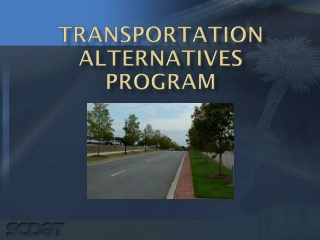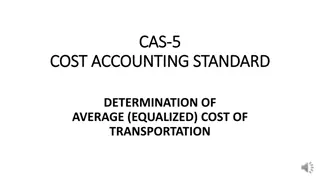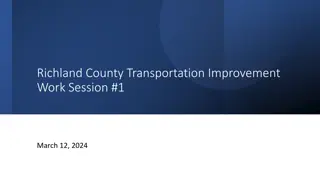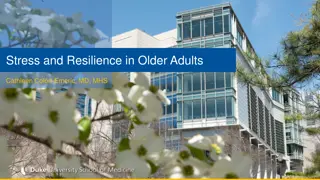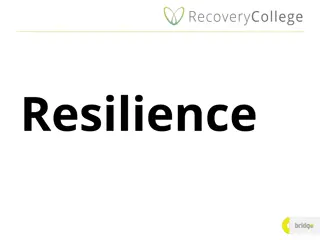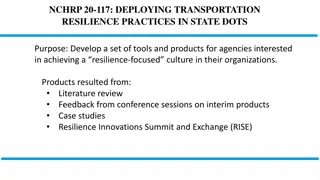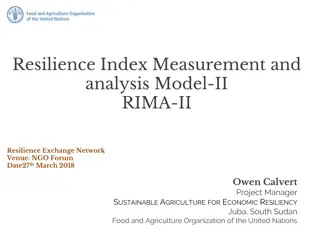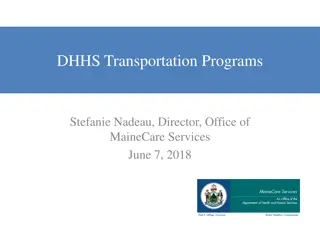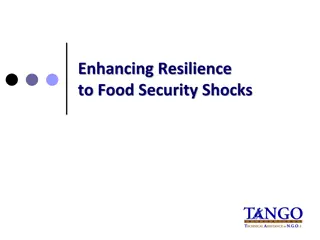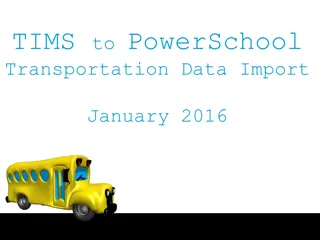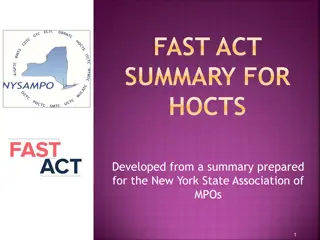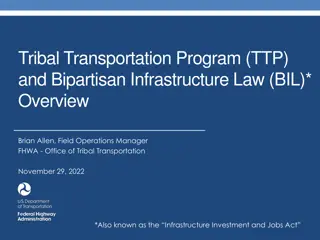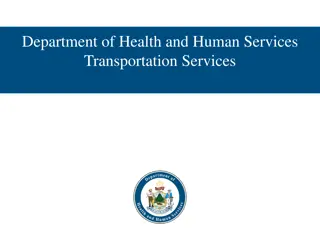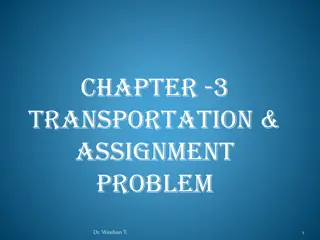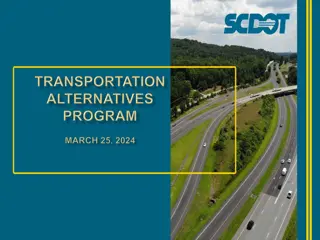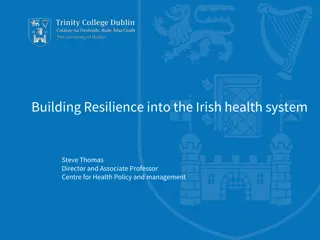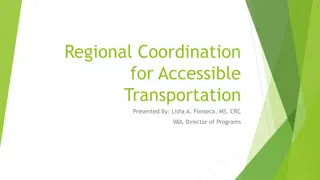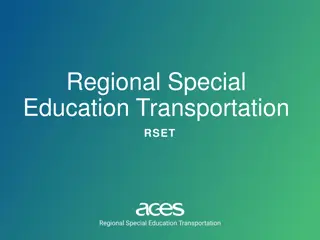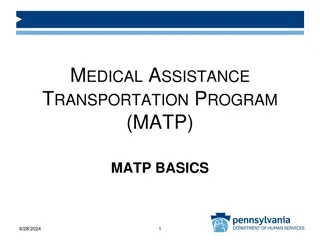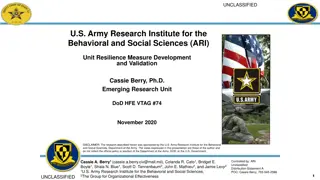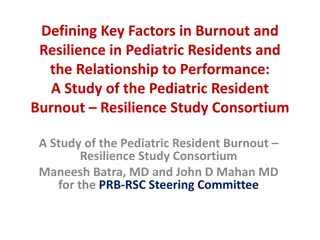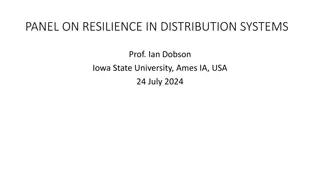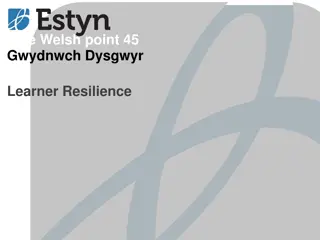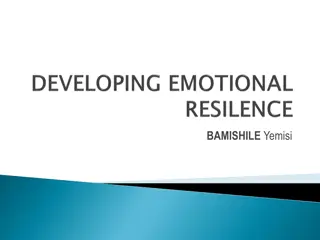Funding Opportunities for Non-Motorized Transportation in South Carolina
The US Department of Transportation's Federal Highway Administration provides funding to South Carolina through the Transportation Alternatives Program (TAP) to support non-motorized transportation initiatives. Local governments, schools, and other entities can partner with the South Carolina Depart
1 views • 21 slides
Enhancing Educational Resilience with RESTA Model
RESTA is an evidence-based intervention model designed to boost Educational Resilience in young individuals by involving educational staff. It differs from other support models by incorporating insights from educational resilience and trauma-responsive practices. Two underpinning models and RESTA pr
0 views • 12 slides
Enhancing Urban Resilience in BRICS through Integrated Infrastructure and Sustainable Development
Dr. George Tsibani discusses the importance of water resilience, sustainable development goals, and the role of BRICS in fostering smart cities and rural-urban integration. The focus is on building resilience in urban water systems for economic growth and societal well-being. Solutions are proposed
1 views • 14 slides
Cost Accounting Standards for Determining Transportation Costs
Understanding the importance of transportation costs in procurement and distribution, this guide outlines the standards for determining average costs, separation of transportation costs in accounting records, objectives for maintaining cost uniformity, components of transportation costs, and treatme
0 views • 11 slides
Cummins Supply Chain Resilience Session Overview
Explore how Cummins has invested in supply chain resilience after a major flood in 2008, including partnering with Horizonscan for a Supplier Resilience Program. Discover insights into their approach, benefits to suppliers, and the importance of supplier resilience. Follow their journey and internal
1 views • 10 slides
Understanding Transportation Programs and Trends
Transportation training session led by Megan Johnson, featuring topics such as Transportation Crash Course, Training Opportunities, and Transportation Trends & Updates. Includes discussions on different types of transportation services and their importance for communities.
2 views • 38 slides
Richland County Transportation Improvement Summary
Richland County's transportation improvement work includes sessions on project principles, funding options, project costs, and guidelines for utilizing the transportation penny. The focus is on addressing transportation needs, project prioritization, funding challenges, and division of funds for var
0 views • 19 slides
Understanding Stress and Resilience in Older Adults
Explore the complex interplay between stress and resilience in older adults, examining models of physical and neurological resilience, recovery trajectories after hip fracture, and dynamic indicators of resilience. Considerations include psychosocial resilience factors like external support, social
0 views • 19 slides
Building Resilience and Dealing with Stress: A University Guide
Explore the concept of resilience, signs of stress, and practical strategies to manage stress while navigating university life. Reflect on challenges, create supportive connections, and improve personal resilience through actionable plans. Remember, resilience is about bouncing back, working through
0 views • 12 slides
Building Resilience: A Guide for Families
Explore examples of adversity and the importance of resilience. Learn what resilience is, how it can be developed, and why it matters. Discover ways parents and caregivers can assist children in building resilience through practical strategies. Myth versus reality around resilience is debunked, emph
0 views • 15 slides
Disaster Resilience Strategy in Developing Countries Vulnerable to Natural Disasters
The IMF's policy paper highlights key challenges faced by small states in building resilience, such as under-investment and donor support post-disaster rather than pre-disaster. The Disaster Resilience Strategy (DRS) emphasizes three pillars for intervention: post-disaster resilience, financial resi
0 views • 11 slides
Understanding Resilience: Coping and Thriving in Challenging Times
Resilience is the key to maintaining well-being in difficult situations, helping us cope with life's challenges and adapt to adversity. It plays a crucial role in protecting mental health and can be developed by anyone regardless of personal history. Learn about risk and protective factors, reflect
0 views • 16 slides
Deploying Transportation Resilience Practices: Tools and Insights
Develop tools for fostering a resilience-focused culture in state DOTs through literature review, case studies, and feedback. Explore various definitions of resilience, including organizational perspective, and key observations from the Transportation Resilience Innovations Summit. Emphasize the imp
0 views • 32 slides
Finland's Recovery and Resilience Plan for Europe: Overview of Key Initiatives
Finland's Recovery and Resilience Plan focuses on addressing challenges identified in CSR reports through a balanced response that promotes growth, resilience, and social impact. Key areas include green and digital transitions, resilience in health and social care, competitiveness and growth, and ed
0 views • 10 slides
Understanding Hybrid Threats and Resilience through Civil Preparedness
Exploring the concept of hybrid threats that combine external threats and internal vulnerabilities, this academic viewpoint by Ramon Loik emphasizes the importance of civil preparedness in building resilience against crises. It delves into aspects such as target selection, active influencing, and th
0 views • 11 slides
Understanding the RIMA-II Model for Resilience Measurement in Agricultural Development
The RIMA-II model offers an innovative quantitative approach to measuring resilience in the context of food insecurity. It provides a framework for understanding how households cope with shocks and stressors, enabling effective assistance for vulnerable populations to build food secure and resilient
5 views • 18 slides
Maine DHHS Transportation Programs Overview
The Maine Department of Health and Human Services (DHHS) oversees various transportation programs aimed at providing non-emergency transportation services to low-income, child welfare-eligible, and Section 17-eligible individuals. These programs are managed through regional brokerage systems, with b
3 views • 5 slides
Understanding Resilience in Food Security Shocks
Resilience in the context of food security shocks involves the ability of individuals, households, communities, and systems to bounce back and recover from various stressors. This resilience is crucial in regions facing continuous crises like the Horn of Africa and the Sahel, where factors beyond we
1 views • 21 slides
Understanding Resilience: A Comprehensive Exploration
Resilience is portrayed as a dynamic process rather than an inherent trait, accessible to all individuals. The capacity for resilience can be developed and harnessed through various resources and support systems. This narrative delves deep into the ordinary yet powerful aspects of resilience, emphas
1 views • 13 slides
Importing TIMS Transportation Data into PowerSchool
Explore the process of extracting, formatting, purging, and importing TIMS transportation data into PowerSchool for efficient management of student transportation information. This includes creating TIMS extracts, updating bus stop information, and optimizing transportation planning through geocodin
2 views • 43 slides
Overview of FAST Act for Transportation Planning
The FAST Act, passed in 2015, authorizes federal programs for transportation development with a focus on surface transportation. It extends funding through 2020, totaling $304.7 billion. The Act aims to enhance resiliency, reliability, and stormwater mitigation in transportation systems. Planning fa
2 views • 10 slides
Tribal Transportation Program & Bipartisan Infrastructure Law Overview
The Tribal Transportation Program (TTP) and Bipartisan Infrastructure Law (BIL) provide funding for essential transportation projects in Tribal communities. The TTP Bridge Fund, Safety Fund, and High Priority Projects aim to improve infrastructure and safety. The BIL funding for FY22-FY26 totals $3.
1 views • 13 slides
Building Resilience: From Stress to Strength
Psychological resilience allows individuals to bounce back from stress, adversity, and change effectively. This book by Gaynor Parkin delves into what promotes resilience, highlighting the importance of everyday habits and exercises in building resilience. The evidence presented covers the role of p
0 views • 23 slides
DHHS Coordination of Transportation Service Contracts Overview
The Department of Health and Human Services in Maine conducted an assessment of Transportation Services in June 2019. The workgroup identified three main priorities: alignment of Quality and Performance Measures, Safety Measures, and Evaluation of Transportation Services. The first priority involves
0 views • 28 slides
Understanding Transportation and Assignment Problem
Transportation and assignment problems involve optimizing the shipment of goods from various sources to multiple destinations while minimizing total transportation costs. These problems deal with limited supply, known demand, constant shipping costs, and integer quantities. The transportation algori
0 views • 64 slides
Enhancing Transportation Infrastructure Through Federal Funding Programs
The Transportation Alternatives Program (TAP) funded by the USDOT's Federal Highway Administration supports transportation projects in South Carolina based on population categories. TAP funds are allocated to Transportation Management Areas (TMAs), Small Urban Areas, and Non-Urban Areas, prioritizin
0 views • 21 slides
Enhancing Resilience in the Irish Health System During Economic Contractions
The Resilience Project conducted at Trinity College Dublin focused on fortifying the Irish health system amidst economic challenges. The project aimed to identify strategies to protect health resources, manage scarcity, pursue reforms, and anticipate future crises. Three key pillars of health system
0 views • 27 slides
Addressing Transportation Gaps in Sudbury: A Livable Community Approach
The Sudbury Transportation Committee, established by the Select Board, aims to enhance transportation in Sudbury to create a livable community. Focusing on inclusivity, equity, and addressing transportation gaps impacting various aspects of livability, the initiative seeks to improve social particip
0 views • 16 slides
Understanding Regional Coordination for Accessible Transportation
This presentation delves into the concept of regional coordination in accessible transportation, focusing on the Regional Transportation Advisory Panel, 5-year regional transportation goals, and the significance of the Safe, Accountable, Flexible, Efficient Transportation Equity Act. It emphasizes t
0 views • 16 slides
Enhancing Livability in Sudbury Through Transportation Initiatives
The GoSudbury! Transportation Update to the Select Board on October 19, 2021 highlights the importance of addressing transportation as a key component of livable communities. The initiative aims to create a safe, secure, and inclusive environment by improving transportation options for residents of
0 views • 26 slides
Regional Special Education Transportation (RSET) Program Overview
RSET, which stands for Regional Special Education Transportation, is an initiative developed by ACES to help districts save money while safely transporting students to out-of-district placement sites. The program benefits districts by reducing transportation costs, addressing parent concerns, and ma
0 views • 13 slides
Understanding Pennsylvania's Medical Assistance Transportation Program (MATP)
The Medical Assistance Transportation Program (MATP) in Pennsylvania provides essential transportation services to access medical care. Governed by state plans and codes, MATP aims to offer access to medical, pharmacy services, chronic disease management, and preventative care. Transportation provid
0 views • 16 slides
Understanding Unit Resilience in the Army: Research Insights
Resilience at the unit level in the Army is essential for sustained performance and readiness. This research project, sponsored by the U.S. Army Research Institute, focuses on measuring and understanding team resilience components and their impact on overcoming stressors. The study aims to validate
0 views • 22 slides
Enhancing Resilience to Food Security Shocks in Africa
Enhancing resilience involves anticipating, adapting to, and recovering from hazardous occurrences in a way that protects livelihoods and supports development. Resilience is vital in regions facing continuous crises due to complex interactions of political, economic, social, and environmental factor
0 views • 32 slides
Developing Resilience Through Physical Education: Strategies and Insights by Damian Hodge
Damian Hodge, an experienced Sport Psychology Manager, shares his expertise in developing resilience through PE sessions for children. He emphasizes the importance of resilience, provides insights on children's experiences, and highlights the significance of fostering resilience in overcoming challe
0 views • 25 slides
Pediatric Resident Burnout & Resilience Study Consortium Overview
This study aims to investigate the factors influencing burnout and resilience in pediatric residents, with a focus on enhancing well-being and performance. The Pediatric Resident Burnout Resilience Study Consortium (PRB-RSC) involves over 20 residency programs in the U.S. to examine the epidemiology
0 views • 18 slides
Enhancing Power System Resilience: Insights and Strategies
Explore the critical aspects of power system resilience in distribution systems, focusing on extreme events, asset hardening, fast recovery, and administrative processes. Learn how resilience differs from reliability, robustness, and other concepts, and discover practical strategies to implement res
0 views • 13 slides
Understanding Resilience in Learners: Key Approaches and Factors
Resilience in learners plays a crucial role in academic performance and emotional well-being. It involves the ability to cope with challenges and adversities. Factors such as self-esteem, self-confidence, and positive relationships contribute to enhancing resilience. This report by Estyn explores ef
0 views • 19 slides
Enhancing Emotional Resilience: Key Strategies and Benefits
Exploring the concept of emotional resilience, this content covers the definition of emotions, emotional resilience, and the domains of resilience. It delves into the importance of emotional resilience, ways to improve it, and how it helps individuals bounce back from adversity, maintain balance, an
0 views • 17 slides
Transportation Finance and Direct Democracy in California
Proposition 6 on November 6th has garnered attention, but voters in multiple states will decide on over 250 transportation ballot measures totaling over $55 billion. California, with a longer history and greater funding needs, has been at the forefront of transportation investments, including the us
0 views • 29 slides
